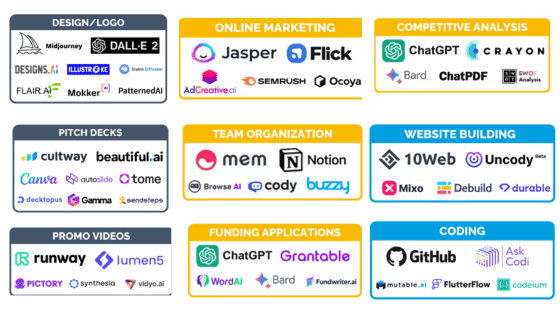In the world of startups, women are proving to be strong innovators and leaders. The balancing act between the demands of entrepreneurship and personal life, especially motherhood, adds an extraordinary dimension to their journey. As a proud project partner of Womenture, an innovative pre-acceleration programme dedicated to empowering female founders in Europe, we have conducted interviews with inspiring female founders to shed light on their unique experiences, challenges, and successes, providing valuable insights and inspiring others to follow in their footsteps.
3 min read
Womenture: Highlighting Female Founders in Germany
By Celesley Torres on 02 August 2024
Topics: Startup Tips Diversity
3 min read
Shifting from Software to Hardware?
By Linh Pham on 07 June 2024
At this year’s HHL SpinLab Investors Day #15, more than 200 guests, including venture capital funds, business angels, and corporates from all over Europe – France, Belgium, Tallinn, Poland, and Italy – came to Leipzig. One of this year's topics was shifting from software to hardware startups.
Topics: Startup Tips Learnings startups Venture Capital Events
5 min read
A startup’s search for its vision and mission… the quest for the holy grail?
By David Blazek on 23 August 2023
If one were to draw a comparison between startups and established companies, the metaphor of a newborn versus an adult might come to mind. Just as newborns go through an incubation phase and eventually face puberty before stepping out into the world, startups embark on a similar journey. They often start in an incubator or accelerator, undergoing a period of growth, and then emerge to either organically expand or be acquired.
Topics: Startup Tips startups
3 min read
Enhancing startup grant applications with ChatGPT
By Eric Weber on 21 August 2023
Applying for grants has the potential to significantly impact startups by providing essential funds and resources for their growth. However, the application process is often intricate, demanding, and time-consuming, requiring startups to create compelling narratives, meet specific criteria, and present accurate financial projections.
Topics: Startup Tips startups
7 min read
Essential AI tools every startup should know about
By Eric Weber on 19 July 2023
As a founder, you face a lot of challenges - from product development to team management to customer support. In this dynamic startup world, AI tools have become an indispensable ally for overcoming these challenges and propelling success. In this article, we introduce you to top AI tools for your startup.
Topics: Startup Tips startups
4 min read
Top startup events in Europe you should not miss in the 2nd half of 2023
By Celesley Torres on 18 July 2023
The first half of this year brought us many inspiring, educational and interactive events with great opportunities for startups. The second half of 2023 is just as full of input and networking opportunities to help your startup grow, whether it be connecting with potential investors, partners or expanding your network with talented people in your industry. Here are the top 5 events that you should keep your eye out for in the coming months.
Topics: Startup Tips Events
4 min read
What founders should prepare to attend a startup event
By Celesley Torres on 13 January 2023
It is important to know that attending events requires more preparation than just booking your transportation and hotel. In order to get the most out of your time at a large startup event, you need a game plan. With the following tips, you can assure that you will leave the event feeling productive and connected to the people you met.
Topics: Startup Tips Events
4 min read
6 Project management tools for startups
By Michèle Tille on 07 December 2022
Startup team members often work in many different areas and rely on visibility and quick access to updates that happen anywhere in the company in real time. Good project management will get you ahead. But around 40% of all projects fail. This is attributed to the Whiscy-Syndrome (Why Isn’t Sam Coding Yet), which means that people start motivated with working on a project, but they realize along the way that the goals have not been precisely defined.
Topics: Startup Tips IT
3 min read
Basic rules to boost the cybersecurity level in your startup
By Hendrik Schulze on 30 November 2022
Ignoring IT Security is one of the most expensive tech debts a startup can take. Yes, you save some time and money at the very beginning of your startup journey. But the price of a security breach, a data loss or only fixing all the mess that had been done at the very beginning could be that high that it will kick you out of the game along the road. Not only will you incur major costs, but perhaps worse, you lose the trust of investors, partners, and customers.
Topics: Startup Tips IT
4 min read
Top startup events in Europe you should not miss in 2023
By Celesley Torres on 24 November 2022
The benefits of attending startup events for founders and their growing teams are countless: from meeting investors, leaders in your industry, listening to inspiring talks and of course connecting and learning from other motivated entrepreneurs. However, it is no secret that attending events takes a lot of time and energy, so making sure that the events you attend are worth your time is essential. To help you to navigate the vast amount of startup events, we have compiled the top 5 hottest startup events in the first half of 2023 that you don’t want to miss!










/SL%20Blog%20Project%20Management%20Tools%20Tips.jpg)
/Cybersecurity%20for%20startups%20blog%20article.jpg)
/GITEX%20GLOBAL%20SpinLab.jpg)

/White%20Versions/stadt_leipzig_white.png?width=130&name=stadt_leipzig_white.png)
/lfca_white.png?width=119&name=lfca_white.png)

/White%20Versions/sachsen_signet_white.png?width=65&height=79&name=sachsen_signet_white.png)